My name is Jean Davison. I am an Adjunct Clinical Instructor at UNC Chapel Hill and I also practice as a Family Nurse Practitioner at a local community health center. From the time I was in graduate school at UNC I have been actively involved in medical missions, primarily overseas. Currently, I am president of a nonprofit volunteer organization called 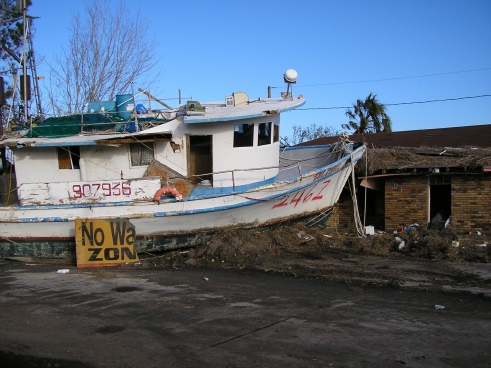 Compassion Med International. Compassion Med International. When I first saw on TV the devastation that Katrina brought to the gulf, the emergency room/medical mission nurse in me wanted to pack my bags and head to the gulf to help. Unfortunately we were already short-staffed providers at PFMC and I had just started as part-time clinical instructor at UNC's FNP fall semester program. Due to these circumstances I helped from afar and planned to take a medical team down during Christmas break. I applied as a volunteer to the American Red Cross, FEMA, and the Bureau of Primary Health Care, and became frustrated with the lack of response from these agencies. Through my church organization I applied to volunteer through the www.katrinaresponse.net site. I heard back right away that New Orleans would welcome a medical team to their free medical mobile unit sponsored by the Christian World Embassy. I was afraid by that time our help may not be needed; I was wrong.
Our team consisted of eight volunteers; one MD, one FNP, two RN, one medical student, one photojournalism student, and computer specialist and engineer student. After loading our two cars with boxes of supplies and our personal items we left at 7am on Saturday, Dec 17 th heading for "the Good News Camp" in New Orleans. Our 14-hour drive brought us into the New Orleans region that evening and the devastation was apparent.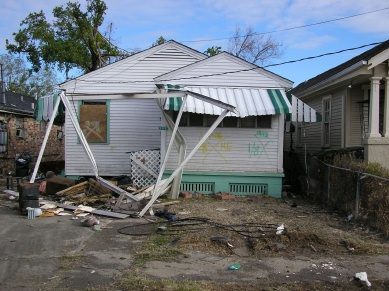
Part of the area still had no electricity, there were boats that had washed up on the highway and stranded vehicles every where, taking a tour of the area Sunday morning made us feel like the hurricane had happened just yesterday, not five months ago, with homes moved off their foundations, covered in mud and debris! Throughout the area were flood lines on homes and agencies buildings such as the Red Cross were boarded and closed down.
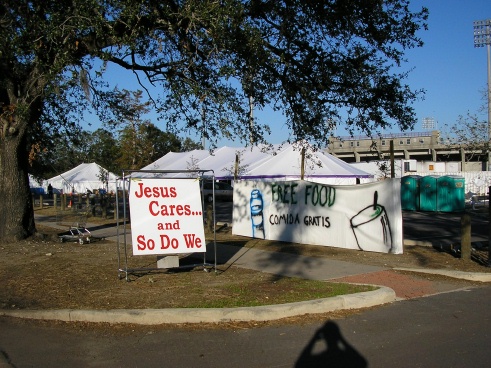
Our "mobile" medical clinic was not really mobile but rather a singlewide trailer powered by a generator, housed at the "Good News Camp" at City Park, New Orleans. We saw primarily construction workers at first with minor injuries, respiratory infection, and those in need of vaccines such as tetanus and influenza. The mobile unit had been staffed by nurses from the health department, when word was out that there were providers that could write prescriptions the "sick" residents of New Orleans and those whose prescriptions had run out for their diabetes, hypertension and other critical medications began coming; some had lost touch with their primary care providers since Katrina (presently there are only 10% of medical providers in New Orleans since pre-Katrina).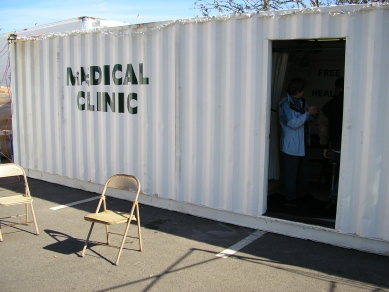 We also saw returning residents who were trying to reclaim any possessions that were not destroy and fix any homes that were not marked for demolition. Many of these had respiratory and skin infections from working around mold and other contaminants. The stories we heard of resident's experiences during the flooding and at the convention center/stadium brought tears to our eyes. We were told by the emergency response center that we were one of a few clinics open in the entire city and the only one at the city park area; Tulane and Charity hospital had closed down and Charity had set up a mobile minor ER at the convention center. When we requested supplies via the emergency response center, we were also told the only supplies we could get would be vaccines and basic first aid supplies. We stopped by Charities convention center ER to ask for some suture supplies and were told by the medical director that they too were short supplies and had none to spare. Had we know that basic supplies would be difficult to obtain, we would have brought them. We had air overnight to us sutures trays, urine dip strips and other items. We found that there is still not a good communication infrastructure in place, that the residents do not know where to go for health care, and that many hospitals and clinics have closed. This was very upsetting to us and part of our mission ended up being organizing supplies to fully run the clinic, set up transportation to the "ER" at the convention center, and provide other teams with contact information and a needs list. Also our computer specialist set up a program for medical records of patients we saw. We also saw returning residents who were trying to reclaim any possessions that were not destroy and fix any homes that were not marked for demolition. Many of these had respiratory and skin infections from working around mold and other contaminants. The stories we heard of resident's experiences during the flooding and at the convention center/stadium brought tears to our eyes. We were told by the emergency response center that we were one of a few clinics open in the entire city and the only one at the city park area; Tulane and Charity hospital had closed down and Charity had set up a mobile minor ER at the convention center. When we requested supplies via the emergency response center, we were also told the only supplies we could get would be vaccines and basic first aid supplies. We stopped by Charities convention center ER to ask for some suture supplies and were told by the medical director that they too were short supplies and had none to spare. Had we know that basic supplies would be difficult to obtain, we would have brought them. We had air overnight to us sutures trays, urine dip strips and other items. We found that there is still not a good communication infrastructure in place, that the residents do not know where to go for health care, and that many hospitals and clinics have closed. This was very upsetting to us and part of our mission ended up being organizing supplies to fully run the clinic, set up transportation to the "ER" at the convention center, and provide other teams with contact information and a needs list. Also our computer specialist set up a program for medical records of patients we saw.
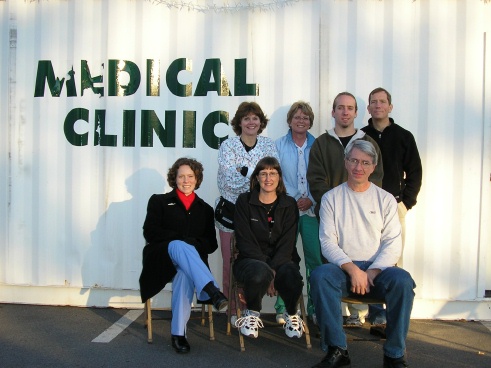 Coming home on Christmas Eve made me thankful for all that I take for granted; family, health, home, electricity, running water and a safe environment. Having witnessed first hand the destruction and lives affected by Katrina, I now say an extra prayer for those that have lost so much and will continue to rebuild for years to come. I ask that we not forget these people, as they are in as much need of our help as when Katrina first hit. Coming home on Christmas Eve made me thankful for all that I take for granted; family, health, home, electricity, running water and a safe environment. Having witnessed first hand the destruction and lives affected by Katrina, I now say an extra prayer for those that have lost so much and will continue to rebuild for years to come. I ask that we not forget these people, as they are in as much need of our help as when Katrina first hit.
|

 Compassion Med International.
Compassion Med International. 

 We also saw returning residents who were trying to reclaim any possessions that were not destroy and fix any homes that were not marked for demolition. Many of these had respiratory and skin infections from working around mold and other contaminants. The stories we heard of resident's experiences during the flooding and at the convention center/stadium brought tears to our eyes. We were told by the emergency response center that we were one of a few clinics open in the entire city and the only one at the city park area; Tulane and Charity hospital had closed down and Charity had set up a mobile minor ER at the convention center. When we requested supplies via the emergency response center, we were also told the only supplies we could get would be vaccines and basic first aid supplies. We stopped by Charities convention center ER to ask for some suture supplies and were told by the medical director that they too were short supplies and had none to spare. Had we know that basic supplies would be difficult to obtain, we would have brought them. We had air overnight to us sutures trays, urine dip strips and other items. We found that there is still not a good communication infrastructure in place, that the residents do not know where to go for health care, and that many hospitals and clinics have closed. This was very upsetting to us and part of our mission ended up being organizing supplies to fully run the clinic, set up transportation to the "ER" at the convention center, and provide other teams with contact information and a needs list. Also our computer specialist set up a program for medical records of patients we saw.
We also saw returning residents who were trying to reclaim any possessions that were not destroy and fix any homes that were not marked for demolition. Many of these had respiratory and skin infections from working around mold and other contaminants. The stories we heard of resident's experiences during the flooding and at the convention center/stadium brought tears to our eyes. We were told by the emergency response center that we were one of a few clinics open in the entire city and the only one at the city park area; Tulane and Charity hospital had closed down and Charity had set up a mobile minor ER at the convention center. When we requested supplies via the emergency response center, we were also told the only supplies we could get would be vaccines and basic first aid supplies. We stopped by Charities convention center ER to ask for some suture supplies and were told by the medical director that they too were short supplies and had none to spare. Had we know that basic supplies would be difficult to obtain, we would have brought them. We had air overnight to us sutures trays, urine dip strips and other items. We found that there is still not a good communication infrastructure in place, that the residents do not know where to go for health care, and that many hospitals and clinics have closed. This was very upsetting to us and part of our mission ended up being organizing supplies to fully run the clinic, set up transportation to the "ER" at the convention center, and provide other teams with contact information and a needs list. Also our computer specialist set up a program for medical records of patients we saw.
 Coming home on Christmas Eve made me thankful for all that I take for granted; family, health, home, electricity, running water and a safe environment. Having witnessed first hand the destruction and lives affected by Katrina, I now say an extra prayer for those that have lost so much and will continue to rebuild for years to come. I ask that we not forget these people, as they are in as much need of our help as when Katrina first hit.
Coming home on Christmas Eve made me thankful for all that I take for granted; family, health, home, electricity, running water and a safe environment. Having witnessed first hand the destruction and lives affected by Katrina, I now say an extra prayer for those that have lost so much and will continue to rebuild for years to come. I ask that we not forget these people, as they are in as much need of our help as when Katrina first hit.